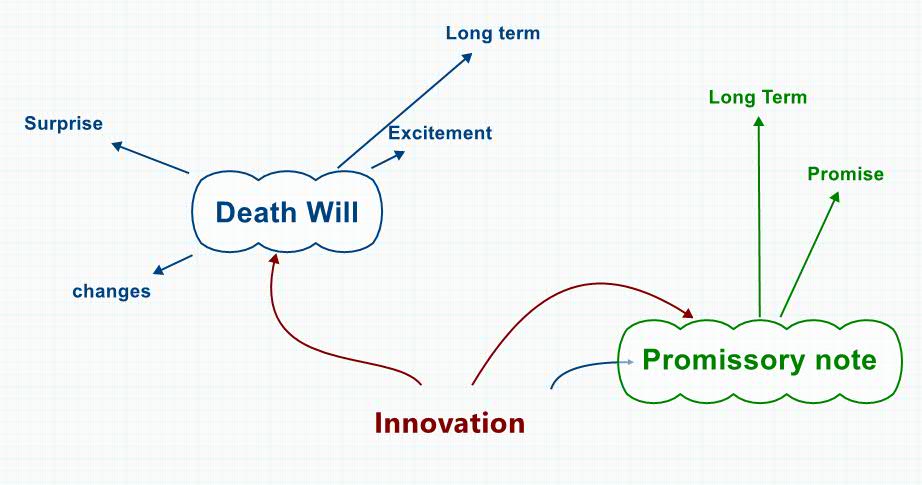In one of my previous posts I explained the reasons for people not being able to meet their new year resolutions. In the same post I pointed out that people often meet their commitment to participate in a social event. In this post we will further explore this subject of making promises and fulfilling them. This subject is important from the innovation perspective because, in my experience, one big difference between companies who innovate consistently and those who can’t is the ability of the former to persistently strive towards achieving innovation goals while keeping their focus on short term targets.
A ‘promissory-note’ (PN) is a legal instrument (more particularly, a financial instrument), in which one party (the maker or issuer) promises in writing to pay a determinate sum of money to the other (the payee), either at a fixed or determinable future time or on demand of the payee, under specific terms. A ‘death-will’ (DW) is a legal declaration by which person names one or more persons to manage his or her estate and provides for the distribution of his or her property at death.
One can revoke a previous ‘death-will’ any time before death by making a new ‘death-will’ that states that all prior wills are no longer valid. One way to make changes to a previous ‘death-will’, without revoking it entirely, is to make a codicil, which is an amendment to a previous ‘death-will’. One doesn’t have to file his/her ‘death-will’ with a court or other governmental authority after it is signed. After the death, however, the will must be filed with the court and thereafter it is made public.
An annual review of the ‘death will’ is a good idea because ownership of property may change over time, or the persons named as beneficiaries may die, or one might wish to relook at the will and rethink the distribution.
Similarities and differences between promissory-note and death-will:
- Surprise:The ‘promissory note’ has no surprises at all. The payee, in fact will be shocked if the promised amount on the due date is not honored. The payee and the issuer are well known to one another and there is no element of surprise in the transaction. ‘Death will’, on the other hand has only surprises. The individual may not even know that he/she is one of the beneficiaries; leave alone the quantum of benefits.
- Amendments: ‘Promissory note’ is an open document and no changes are done once they become a legal document. On the other hand, the creator of ‘death will’, can make multiple revisions until he or she is dead or the time of opening the death-will has arrived.
- Excitement/Disappointment: There is no excitement in the ‘Promissory note’ but the excitement to beneficiaries of the ‘Death will’ is very high. This excitement is on two counts: (1) Getting to know that he or she is a beneficiary is exciting but could be disappointing for those who expected but didn’t find their name (2) The quantum of benefits – This could also lead to excitement or disappointment depending upon the expectations.
- Term: ‘Promissory note’ and the ‘Death will’ both are typically not short-term.
Learning for innovators:
Bigger innovations typically have a longer gestation period, which could be several months or years depending upon the industry. Hence innovation projects need to be resourced for a longer period and to ensure this the investments should reflect in the Long-Term plan. Unfortunately, in most companies, specific innovations projects do not find a mention in the LT plan. A few companies who include specific innovation opportunities in the LT plan have not been able to connect their annual plan with the LT plan, which is necessary to ensure that the resources are allocated to the innovation projects.
PN and DW contain very specific promises which gets executed unambiguously on a predefined date or event. Innovation targets too should be in the form of very specific projects with clear investment plan and an end date.
DW allows amendments and the same should be permitted for innovation projects. Amendments in the end goal, investment plan and the end date should be allowed, with sound reasoning.
PN and DW are legal documents and binds people involved in the transaction. We need to make innovators commit themselves to specific innovation projects. We also need to ensure that the innovators persistently strive to keep their commitment. This cannot be achieved through a legal process, but in my previous post, I had suggested changes in the compensation structure to achieve this.
References:
http://en.wikipedia.org/wiki/Promissory_note
http://en.wikipedia.org/wiki/Will_and_testament
https://www.legalzoom.com/knowledge/last-will/faq/change-revoke-wills (US)
http://www.peoples-law.org/frequently-asked-questions-about-wills

